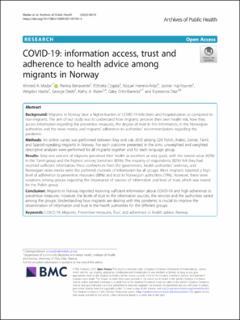| dc.contributor.author | Madar, Ahmed A. | |
| dc.contributor.author | Benavente, Pierina | |
| dc.contributor.author | Czapka, Elzbieta | |
| dc.contributor.author | Herrero-Arias, Raquel | |
| dc.contributor.author | Haj-Younes, Jasmin | |
| dc.contributor.author | Hasha, Wegdan Hamed Nasser | |
| dc.contributor.author | Møen, Kathy A. | |
| dc.contributor.author | Ortiz-Barreda, Gaby | |
| dc.contributor.author | Diaz, Esperanza | |
| dc.date.accessioned | 2022-02-07T08:42:29Z | |
| dc.date.available | 2022-02-07T08:42:29Z | |
| dc.date.created | 2022-01-24T18:00:31Z | |
| dc.date.issued | 2022 | |
| dc.identifier.issn | 0778-7367 | |
| dc.identifier.uri | https://hdl.handle.net/11250/2977387 | |
| dc.description.abstract | Background
Migrants in Norway bear a higher burden of COVID-19 infections and hospitalization as compared to non-migrants. The aim of our study was to understand how migrants perceive their own health risk, how they access information regarding the preventive measures, the degree of trust in this information, in the Norwegian authorities and the news media, and migrants’ adherence to authorities’ recommendations regarding the pandemic.
Methods
An online survey was performed between May and July 2020 among 529 Polish, Arabic, Somali, Tamil, and Spanish-speaking migrants in Norway. For each outcome presented in the aims, unweighted and weighted descriptive analyses were performed for all migrants together and for each language group.
Results
Sixty-one percent of migrants perceived their health as excellent or very good, with the lowest value (42%) in the Tamil group and the highest among Somalians (85%). The majority of respondents (82%) felt they had received sufficient information. Press conferences from the government, health authorities’ websites, and Norwegian news media were the preferred channels of information for all groups. Most migrants reported a high level of adherence to preventive measures (88%) and trust in Norwegian authorities (79%). However, there were variations among groups regarding the importance of sources of information and level of trust, which was lowest for the Polish group.
Conclusion
Migrants in Norway reported receiving sufficient information about COVID-19 and high adherence to preventive measures. However, the levels of trust in the information sources, the services and the authorities varied among the groups. Understanding how migrants are dealing with this pandemic is crucial to improve the dissemination of information and trust in the health authorities for the different groups. | en_US |
| dc.language.iso | eng | en_US |
| dc.publisher | BMC | en_US |
| dc.rights | Navngivelse 4.0 Internasjonal | * |
| dc.rights.uri | http://creativecommons.org/licenses/by/4.0/deed.no | * |
| dc.title | COVID-19: information access, trust and adherence to health advice among migrants in Norway | en_US |
| dc.type | Journal article | en_US |
| dc.type | Peer reviewed | en_US |
| dc.description.version | publishedVersion | en_US |
| dc.rights.holder | Copyright The Author(s) 2021 | en_US |
| dc.source.articlenumber | 15 | en_US |
| cristin.ispublished | true | |
| cristin.fulltext | original | |
| cristin.qualitycode | 1 | |
| dc.identifier.doi | https://doi.org/10.1186/s13690-021-00764-4 | |
| dc.identifier.cristin | 1988924 | |
| dc.source.journal | Archives of Public Health | en_US |
| dc.identifier.citation | Archives of Public Health. 2022, 80, 15. | en_US |
| dc.source.volume | 80 | en_US |

